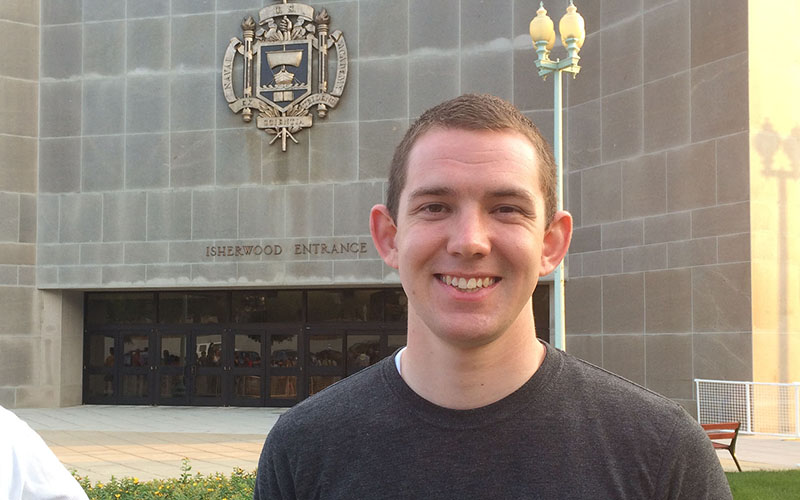
Mesa resident Colin Gallacher on “I-Day,” or Induction Day at the U.S. Naval Academy, getting ready to start his 12-hour journey to becoming a plebe. (Photo by Jamie Cochran)
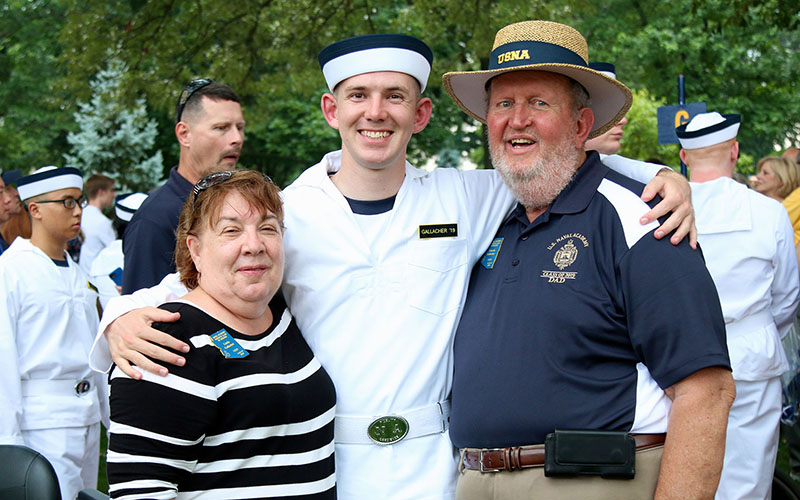
Colin Gallacher and his parents, Linda and Lincoln, share a few moments after the oath of office and before Colin starts his plebe summer at the academy in earnest. (Photo by Jamie Cochran)
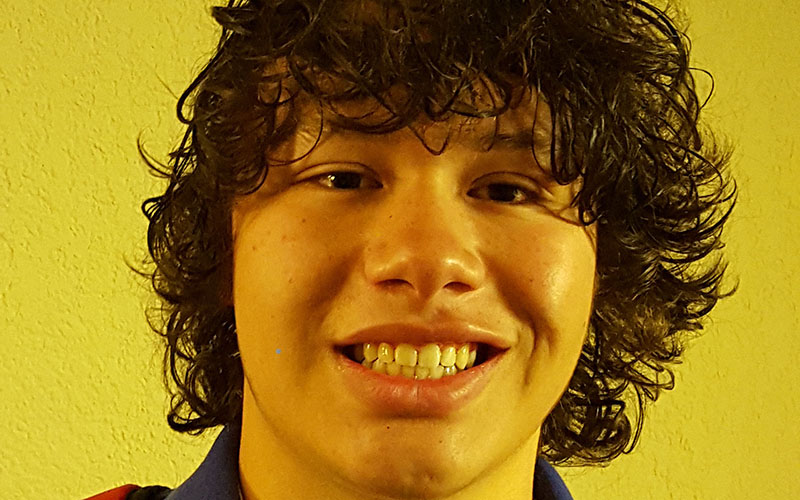
Nick Herrera said he stopped cutting his hair after he got his Naval Academy acceptance letter, knowing it would all be shaved off as part of his induction. (Photo by Jamie Cochran)
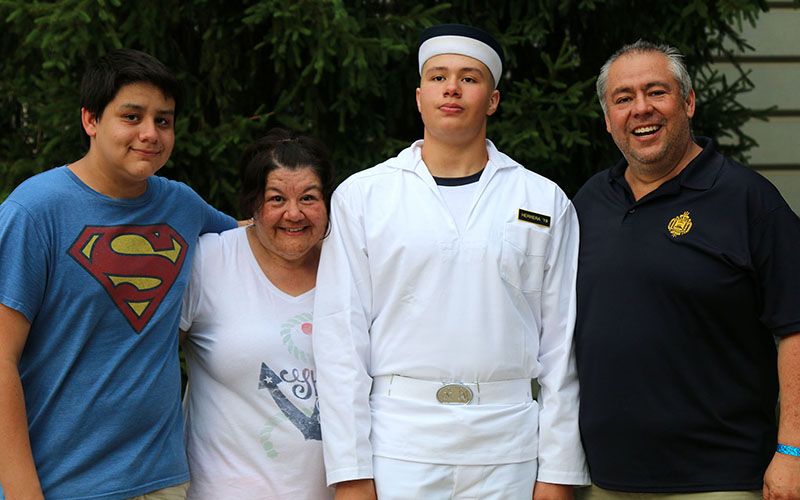
Nick Herrera of Peoria shares a few minutes with his brother, Chris, and parents Leisa and Alberto, after taking the oath of office at the U.S. Naval Academy. (Photo by Jamie Cochran)
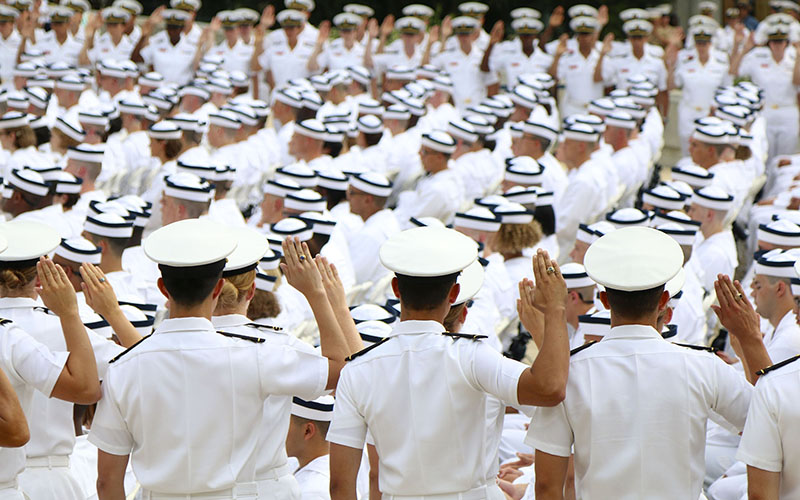
Upperclassmen at the Naval Academy surround the plebes that they will lead – and prod – over the next six weeks as they indoctrinate them into the ways of the academy. (Photo by Jamie Cochran)
ANNAPOLIS, Md. – Recent high school graduate Nick Herrera, 17, of Peoria, has one sibling, a passion for wrestling, a messy nest of hair and an earnest manner when he answers questions.
Colin Gallacher, 22, is the youngest of seven and has two years of college under his belt. The close-cropped Mesa resident is fluent in Japanese after a two-year mission there, yet is relaxed and almost playful as he interrupts his dad to tell his story.
The two couldn’t appear to be any more different.

The plebes inducted to the U.S. Naval Academy will be part of the class of 2019, if they survive the rigors of the next six weeks, and the next four years.
But those differences largely disappeared when Herrera and Gallacher raised their right hands Wednesday and took the oath to began their careers at the U.S. Naval Academy.
They were among a number of Arizona residents – and about 1,200 incoming midshipmen overall – who began the six brutal weeks of plebe summer Wednesday, a sort of academy boot camp before they start their studies in the fall.
They are part of what Vice Adm. Ted Carter, the superintendent of the academy, called the smartest class on paper that the academy has ever had, with the highest acceptance rate and the highest number of women – a little more than one-fourth of the class.
Induction day is what “we call the dawn of the new day,” Carter said, promising at the outset of the day to take the boys and girls who came through the academy gates that morning and in about 12 hours “transition them into young men and women.”
Plebes by the numbers
Facts about the U.S. Naval Academy class of 2019 that was inducted this week:
Young men and women with less hair and identical, plain clothing.
The oath of office is the culmination of induction day, but before they get to that point the plebes are processed with a military efficiency.
They are told to follow a line on the floor from station to station where they are injected, interrogated, fitted, shorn and yelled at. They turn over their civilian clothes and are handed an empty bag that is slowly filled with gear, at which point some looked like they were about to fall over under the weight. They are taught how to salute and how to answer a question and handed a book of rules to memorize.
Newly shorn and stripped of their civilian identities, the plebes re-emerge from buses hours later and file into Tecumseh Court where they take their seats while sweaty and emotional family members and friends strain to snap pictures.
The ritual was briefly interrupted by laughter when the plebes stood to take the oath and many lifted the chairs up with them, as the government-issue canteens strapped to the back of their belts caught the chairs.
They pledged to “well and faithfully discharge the duties of the office on which you are about to enter” – yelling an enthusiastic, “I do.”
“When they actually took the oath, that’s when I teared up,” said Linda Gallacher, Colin’s mom. “It has finally become real.”
Induction day is the end of a relatively long road for Gallacher, who filled out the “inch-and-a-half thick” academy application two times before, only to be waitlisted both times. But he refused to give up.
He said this week that he feels sorry for anyone who moves to plan B or plan C before giving plan A their best attempt.
His parents said it has been a long process for Colin, who “has been doing this for five years.” But they are excited about the education and employment he will receive, as well as the opportunity for him to serve his country.
Gallacher said he has dreamed about this process for so long, he couldn’t believe it was finally happening. But he was ready to “roll with the punches.”
“It’s a lot of unknown. You hear stories and people tell you what to expect, but there’s nothing like being there,” he said.
Herrera, on the other hand, said he didn’t start thinking about the academy until he joined the wrestling team in high school.
“I liked being a part of a team,” and that got him thinking about the academy, said Herrera, who came to plebe summer straight from high school.
In anticipation of induction day, Herrera stopped cutting his hair after getting his acceptance letter in January, when he also began mentally preparing himself for the day.
“I’m prepared to listen to directions and have them tell me what to do,” he said.
Even after a 12-hour day, Herrera said he was “excited for tomorrow morning.”
“It’s more that I thought it would be, which is a good thing,” he said.
It was a bittersweet day for families. After induction day, they will not get to see their sons and daughters until after plebe summer – and can’t get more than three phone calls from them.
Alberto and Leisa Herrera said they were sad at being separated from their son, but are excited at seeing him grow into a young man. They weren’t the only emotional ones – Alberto Herrera said that right before the family left Arizona, Nick “hugged the dog and almost cried.”
A veteran himself, Alberto Herrera said he did not thinkg anything of the oath when he took it years ago, but got choked up at the thought of his son “stepping up and saying, ‘I will do it.'”
After taking the oath, Gallacher stood with his parents on a muggy Annapolis evening, surrounded by thousands on the academy grounds. He was still light-hearted, and making jokes with his parents about having a canteen strapped to his butt at all times.
But after a tough first day, he said he plans on following the superintendent’s advice and will be “taking it one day at a time.”